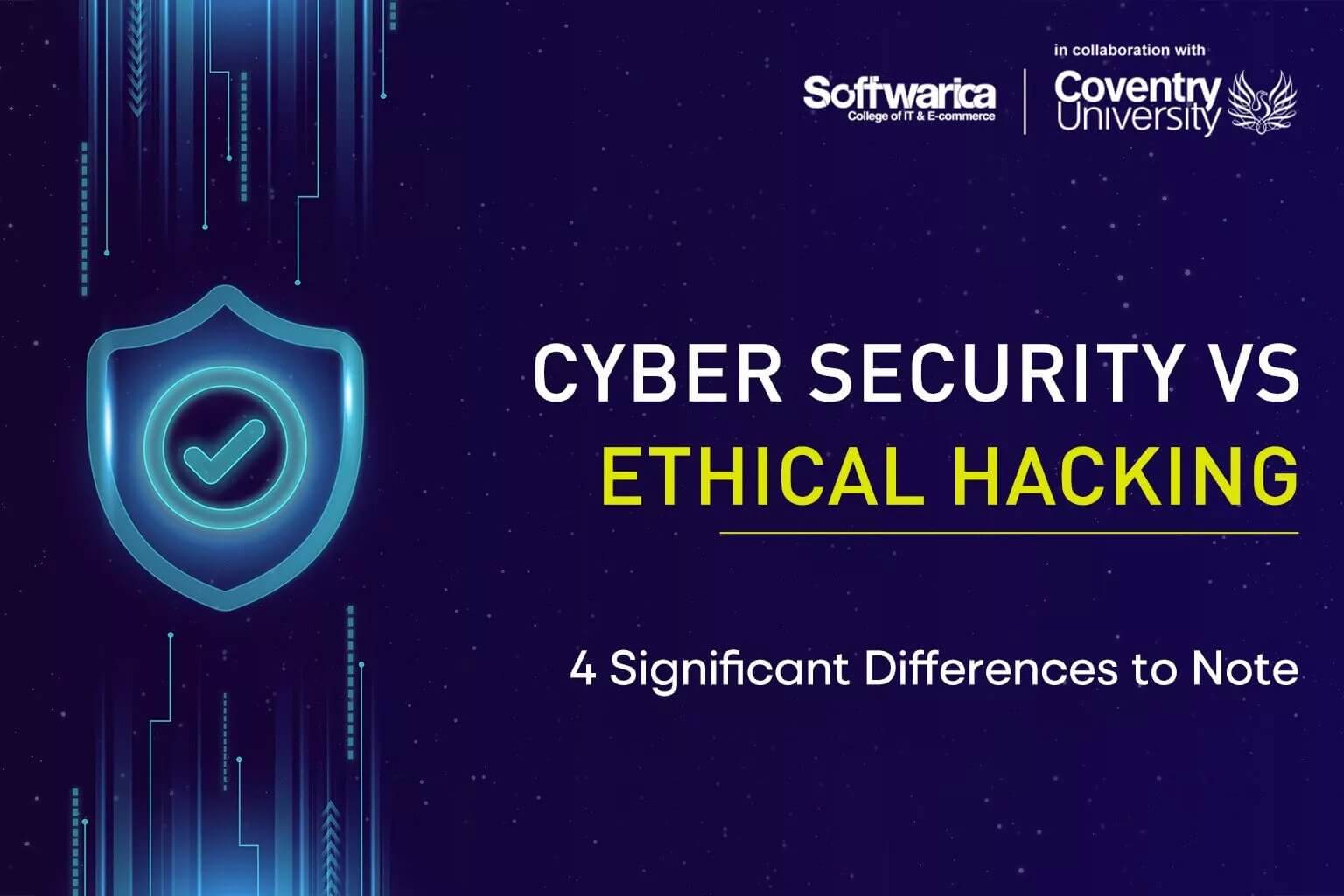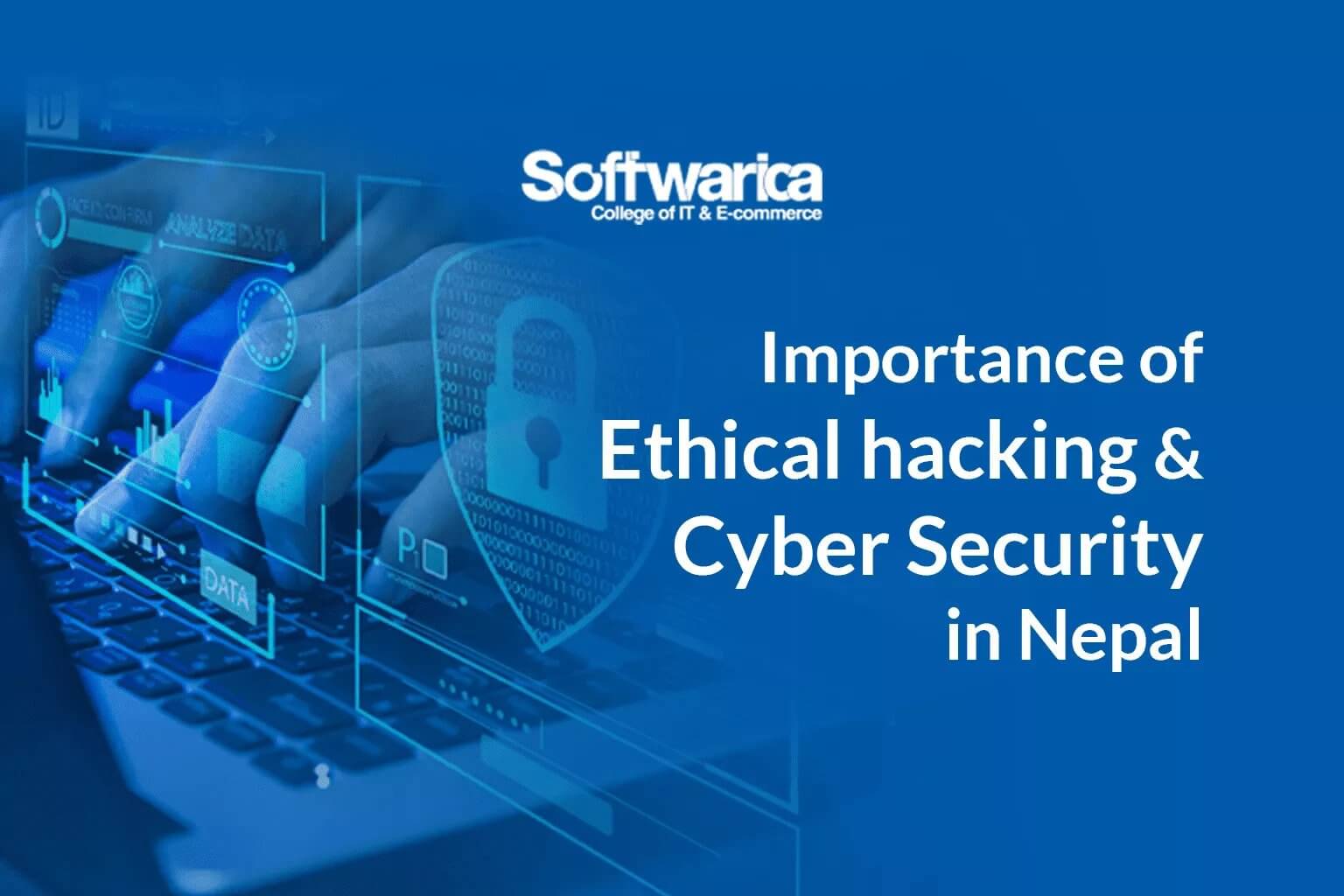
Cyber Security vs. Ethical hacking: 4 Significant Differences to Note
Cyber security and ethical hacking are crucial parts of many organizations as cyber crimes are increasing at a high rate. Many people confuse the terms “cyber security” and “ethical hacking” to be the same. Although both of them play the role in protecting the computer system; they vary in their functions. Cyber security includes the overall activities of preventing and managing the data and information of the system whereas ethical hacking is one of the important parts of cyber security.
Let’s explore these technical terms in detail to learn more about cyber security vs. ethical hacking.
What is Cyber security?
Cyber security is an approach consisting of a set of techniques and principles designed to protect the programs, data, information, and network of your computer system from unauthorized entry.
There is no doubt about the advancement of technologies these days; however, the excessive rise in cybercrimes globally shows that the flaws in networks and systems are still difficult to eliminate. These flaws are reasons for the cyber threats which are present in many forms.
We have listed some of the common forms of cyber threats here:
- Malware
This threat is related to viruses and ransomware. Attackers install harmful software and applications in your system damaging it and making you unable to access your own data.
- Phishing
Here, cyber attackers set the trap by providing falsehood forms and asking you to fill them and steal your personal information.
- Trojans
If you are experienced in the network fields, you most probably have heard about Trojans as they had become very popular in the past. It immediately attacks your system right after you click on them providing an easy gateway for cyber attackers.
According to a report from Nepal Telecommunication Authority, 90.60 % of people in the country have access to the internet and the rate is only likely to increase in the future. From small-scale to large-scale organizations, many use network systems in their operation. So, there is always a risk of cyber threats which has increased the need for cyber security in Nepal.
Recently, the cases of cybercriminals tricking network users into financial frauds and information leakage have increased significantly. It raised the question of cyber security in Nepal. Considering these facts, the Cyber bureau was established in Nepal in 2018 to facilitate legal actions against cyber fraud.
The news regarding the cybercrimes such as hacking of ATMs and leaking of personal information falsely has alerted many organizations and they have started hiring cybersecurity professionals. So, how to be a cyber-security professional? The good news is that many institutes offer cybersecurity courses in Nepal. The courses include a program where you learn about the reasons for the risk of cyber threats in the system and the steps you can take to prevent those risks.
So, which sector will you be working in after completing the cyber security course in Nepal? You will be happy to know that there are many options for you. The course creates a way for developing a fulfilling career in companies like; software companies, banking organizations, e-commerce sites, and other IT-dependent companies.
What is Ethical Hacking?
When the word “hacking” buzzes in our ears, we normally think of illegal access to the computer systems of private networks. However, when hacking is done with permission, they are known as ethical hacking. Ethical hacking has big importance today as many incidents of hacking are increasing. Ethical hacking means unethical accessing of the data, device, or system of the organization in an authorized way. The ethical hacker does it to identify the defects or flaws in the system which could be exposed by cyber-criminals. The aim is to resolve those defects before cyber-attacks.
So, are you interested in becoming a “hacker”? Obviously! The legal and ethical one. An ethical hacking course is available for you if you are looking to develop a career in this sector. With an ethical hacking course, you learn about the vulnerabilities of the system including the risk of data exposure, authentication breach, virus attacks, security setting changes, and many other similar threats.
Difference between Cyber Security and Ethical Hacking
Both have the same primary aim which is to prevent cyber-attacks. So, what makes them different? Let’s categorize the difference between cyber security and ethical hacking into different criteria.
- Background knowledge
Cyber Security is a tool with a set of techniques and principles designed to protect the programs, data, information, and network of your computer system from unauthorized entry.
Ethical hacking means accessing the data or system in an unethical way with permission from the organization.
- Monitoring
Cyber security monitors the system to keep it updated regularly.
Ethical hacking tests the system on a regular basis for identification of the risks of hacking.
- Function
Cyber security works for the maintenance of the whole network system.
Ethical hacking is a sub-part of cyber security.
- Way of work
Cyber security works in a way to defend the system. We can refer to it as defensive tactics against cybercrimes.
Ethical hacking attacks the system to identify the weakness and defects in the system so that they can be resolved before the attack from the cyber-criminals.
Cyber security vs. Ethical Hacking: Which is better? Job Role
All right, now we know how cyber security and ethical hacking jobs are different. Here, we have listed some primary job roles for both.
Cyber security specialist’s job roles
- Cyber security specialists are responsible to ensure that the system is up to date. They regularly inspect the security system to keep it updated.
- They generate ideas for making the system stronger and difficult to break.
- In case there is an attack on the system, the specialist is responsible to prepare and report the impact.
- Cyber security specialists provide effective suggestions once the weaknesses of the systems are identified.
Ethical hacker’s job roles
- Ethical hackers hack the system with permission and identify the flaws.
- Ethical hackers prepare a report of the identified flaws and present it.
- Once the flaws are resolved, they test the system again and provide feedback.
- Ethical hacker research and identify ways to hack the particular system and test it to identify the risks.
It is important to learn in detail about the network system for developing cyber security careers. The cyber security courses and ethical hacking courses are the basis for becoming experts in this sector.
Conclusion
Comparing cyber security vs. ethical hacking, we see both of them as winners. In this digital world, computer networks are needed for any type of organization for managing data. Whether it is the hospitality sector, medical sector, or banking sector, computer networks have a big role in their operation. As much confidential and sensitive data and information are stored in the system, it is important that they are not touched by unauthorized people to prevent loss, theft, and damage. Cyber security plays a big role in preventing data breaches whereas ethical hacking is an important subdivision of cyber security. Interested in the cyber security and ethical hacking course? Join Softwarica College and become professional ethical hackers. The learners from Softwarica College are efficient in preventing confidential data from being breached and are also able to gather evidence against the attackers to take legal action against them.





